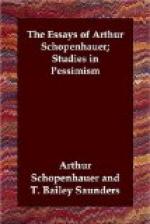In the Politics[1] Aristotle explains the great disadvantage which accrued to the Spartans from the fact that they conceded too much to their women, by giving them the right of inheritance and dower, and a great amount of independence; and he shows how much this contributed to Sparta’s fall. May it not be the case in France that the influence of women, which went on increasing steadily from the time of Louis XIII., was to blame for that gradual corruption of the Court and the Government, which brought about the Revolution of 1789, of which all subsequent disturbances have been the fruit? However that may be, the false position which women occupy, demonstrated as it is, in the most glaring way, by the institution of the lady, is a fundamental defect in our social scheme, and this defect, proceeding from the very heart of it, must spread its baneful influence in all directions.
[Footnote 1: Bk. I, ch. 9.]
* * * * *
That woman is by nature meant to obey may be seen by the fact that every woman who is placed in the unnatural position of complete independence, immediately attaches herself to some man, by whom she allows herself to be guided and ruled. It is because she needs a lord and master. If she is young, it will be a lover; if she is old, a priest.
ON NOISE.
Kant wrote a treatise on The Vital Powers. I should prefer to write a dirge for them. The superabundant display of vitality, which takes the form of knocking, hammering, and tumbling things about, has proved a daily torment to me all my life long. There are people, it is true—nay, a great many people—who smile at such things, because they are not sensitive to noise; but they are just the very people who are also not sensitive to argument, or thought, or poetry, or art, in a word, to any kind of intellectual influence. The reason of it is that the tissue of their brains is of a very rough and coarse quality. On the other hand, noise is a torture to intellectual people. In the biographies of almost all great writers, or wherever else their personal utterances are recorded, I find complaints about it; in the case of Kant, for instance, Goethe, Lichtenberg, Jean Paul; and if it should happen that any writer has omitted to express himself on the matter, it is only for want of an opportunity.
This aversion to noise I should explain as follows: If you cut up a large diamond into little bits, it will entirely lose the value it had as a whole; and an army divided up into small bodies of soldiers, loses all its strength. So a great intellect sinks to the level of an ordinary one, as soon as it is interrupted and disturbed, its attention distracted and drawn off from the matter in hand; for its superiority depends upon its power of concentration—of bringing all its strength to bear upon one theme, in the same way as a concave mirror collects into




